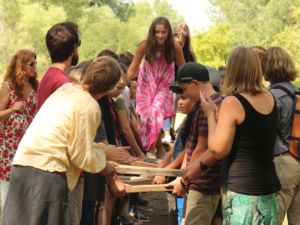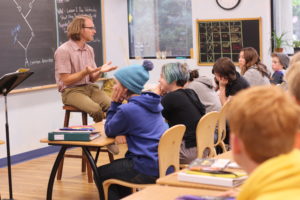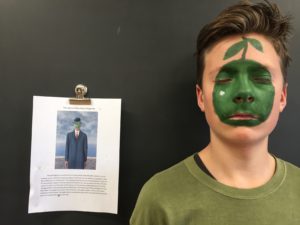
Middle School Grades Program (6th-8th)
The Mountain Sage educational program for grades 6th-8th is grounded in Waldorf education and sustainability, and draws inspiration from relevant modern day thinking aligned with our core values. Teachers are focused on whole-child education, academic readiness and excellence, and building community.
Grade 6
In the sixth grade year, students are seeking to understand themselves -- their changing bodies, their growing skills sets, and their new interests -- within the context of their peers and larger community. Inwardly, students will repeatedly ask themselves: Who am I? Am I accepted and loved for who I am? Beyond my family, who are my people? Outwardly, this becomes questions such as: Why? Who said? How come? Why does it really matter? Do I have to? A desire to understand the world, connect cause and effect, and grasp the world intellectually is awakening within them. Each child will reach this awakening at different speeds as they turn twelve years of age. They still desire to emotionally and physically experience their world as they confront this new desire to intellectually “understand” it. In order to meet these needs within school, our methodology is to create a social, experiential classroom. Your child will do more group-oriented projects, be asked to work with all kinds of peers, and have greater responsibility for independent planning, organizing, and contributing. We do lots of hands-on projects to apply new skills to the “real” world.
Math: Percent; beginning algebra and negative numbers; ratios; proportions; geometric drawing with instruments and proofs; business math/basic economics
Literature & Grammar: Advanced grammar; descriptive compositions; spelling; biographies; business letters; the Roman Empire and medieval literature
Science: Mineralogy; physics (acoustics, electricity, magnetism, optics and heat); astronomy; and gardening
Music: Singing in three voicings (soprano, alto, tenor); recorders in three voicings (soprano, alto, tenor); ukulele, basic chord structures; music theory, key signatures, time signatures
Art: Consider concepts of perception/subjectivity in art; focus on line- abstract and figurative drawing, geometric, calligraphy and animal portrait; focus on color- oil pastel color wheel and watercolor veil painting
World Language: Spanish reading and translation of stories
Handwork: Pattern making; 3-D construction (visualizing from two-dimensional to three dimensional finished product)
History/Social Studies/Geography: Beginning world geography, the Roman Empire, medieval, and Central and South American geography, history, and culture
Technology: Computer introduction to Microsoft office suite, introduction to Teen Citizenship
Physical Education: Sport skills, competitive games, cooperative games, and Medieval games
Service Learning: Knighthood Project (service to family and to the school community)
Grade 7
Developmentally, Steiner speaks about this year as the “tender” years of middle school. Students are finding themselves within new peer groups, new bodies, and with new interest and desires. They are still very much motivated by the social group and long to become their true selves, even as they don’t quite understand who that self is just yet. A new thirst for the intellect is awakening as well as a new desire to more intensely question. Therefore, the theme of this year is discovering the world while simultaneously pursuing a discovery of self. Similar to the explorers and scholars of the Renaissance, we will be pushing beyond the boundaries of the known world to gain new perspectives. During our chemistry, physiology and physics blocks, we will make new discoveries about the nature of our physical world. During our geography and history blocks, we will explore and gain a new vision of the interior world of human consciousness. These blocks mirror the developmental stage of the 7th grader. Our greatest hope during this year is to provide a variety of experiences that will nurture their love of learning and to help students to gain a deeper sense of the world and their place within it.
Math: Algebra; mathematical thinking/theory; geometry continued; and graphing
Literature & Grammar: Creative writing (short fiction, poetry, one act plays) English literature; grammar review; research methods and projects.
Science: Physics (mechanics/simple machines); anatomy and physiology; human development and nutrition; inorganic chemistry; continuation of garden and nature studies
Music: Singing in three voicings (soprano, alto, baritone), African music; recorders in four voicings (soprano, alto, tenor, bass); ukulele; music theory, key signatures, time signatures; music history/composer research
Art: Theme of detail and big gesture; focus on simplicity, contrast and texture; tudy African, Renaissance and Baroque artworks; working with graphite and charcoal mediums; drawing in a gestural style, still-life and perspective; ntroduction to painting value with acrylics.
World Language: Spanish reading and conversation
Handwork: Hand-sewn clothing; carving wooden bowls; metalwork
History/Social Studies/Geography: Renaissance, Reformation, Age of Exploration, and African culture and geography
Technology: Expanded use of computers and Microsoft office suite; continued study in Cyber Civics
Physical Education: Team sport, strategy and team work games. Cooperative games and Dynamic skills practice
Service Learning: Clean the Creek (Service to school and community at large)
Grade 8
The theme of this year is revolution--defining the world as it could be and creating our place within it. Developmentally from a Waldorf perspective, students will be seeking to create great change within themselves and within the world as they prepare to graduate from Mountain Sage and go on to high school and beyond. Similar to the revolutionary leaders in the 18th Century, students will be invited to question important principles they used to accept as fact and strive to create a place in the world that they can truly claim as their own, reflective of their most important ideals. Students will explore and gain new perspectives on the interconnectedness of our planet and our place within it.
Math: Practical applications of arithmetic; set concepts; algebra; solid geometry; platonic solids
Literature & Grammar: Current events; writing and producing short films; Shakespearean drama.
Science: Physics (aerodynamics and hydrology); organic chemistry; continuation of a human anatomy and physiology; ecology; and meteorology
Music: Singing in four voicings (soprano, alto, tenor, baritone), choral music; recorders in four voicings (soprano, alto, tenor, bass); ukulele; music theory; improvisation
Art: Theme of Spaciousness, while considering Freedom/Constraint, Change/Destruction, Light/Dark; emulate the Enso and Ikebana styles of Zen artwork; recognize art movements, art as politics and how art can be used as a societal protest; printmaking project with focus on image; painting a self-portrait in surrealistic style.
World Language: Spanish dialogue, original writing and novel reading
Handwork: Machine sewing of original garments; bookbinding; soapstone carving; clay sculpture; woodcarving; metalwork
History & Social Studies: World trade and economics; American/Modern History (Revolutions and Civil Rights)
Geography: World geography; Asia and other culturally diverse regions around the world
Technology: Computers skills and use are a part of all subjects in preparation for high school
Physical Education: Team sports, strategy and team work games. Cooperative games and dynamic skills practice
Service Learning: Self directed volunteer project at community organization of student choice